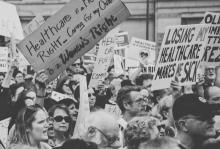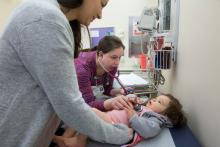affordable health care

THE LAST TWO years have been extraordinarily difficult for many Christians in the United States who care about social justice and treating the most vulnerable as we would treat Christ himself, given the cruelty of the Trump administration toward the ones that Jesus calls the least of these.
Yet a significant change in our collective imagination is showing signs of emerging out of the 2018 midterm elections and the new public policy debates around health care and climate change, at least in the House of Representatives under new leadership. If realized, this shift could be profoundly important and hopeful for the future of our nation and our planet.
For decades now, we have lacked both the seriousness of purpose and the commitment that we will need to change the status quo on both of these issues, and changing that should be a moral imperative for Christians.
The next few months have the potential to significantly shift the terms of political debate in the United States and even reshape the public’s perception of what our country can achieve on access to affordable health care and efforts to avoid the most catastrophic levels of climate change.

IN MINNESOTA, Alec Smith was unable to afford either health insurance premiums or the insulin needed to treat his Type 1 diabetes, despite working full time. He died last year from diabetic ketoacidosis, at age 26. Other young Americans with diabetes have suffered the same fate.
David Bridges of Indiana has health insurance through his job, but a high deductible means he has to pay for his multiple prescriptions out of pocket. One of those prescriptions alone costs $700 a month. He maxes out credit cards to buy what medicine he can, yet still has to skip doses.
These stories represent the status quo of U.S. health care, even with the preservation of the Affordable Care Act. In responding to such gaps, the faith community has traditionally turned to the direct provision of charity health care, a generous hallmark of our traditions for generations. But we cannot stop there.

Ruby Garner is a health educator for Health People, an organization in New York’s South Bronx that provides services to people in need. She is an adviser to the AIDS Institute of the New York State Department of Health and partners with her church, First Corinthian Baptist in Manhattan, to provide medical care to its lower-income neighbors.
Website: healthpeople.org
1. What inspired you to partner with your church? Being able to give to my community, which has a lot of disparities, and deliver information and resources to people who need them is my passion. Working at Health People, I do presentations on behalf of the state of New York on diabetes prevention, health care for women, HIV, how to establish and maintain healthy relationships, and other topics. It made sense to take what I already do and bring it to my church.

The stall in funding for CHIP, federally-funded program that covers moderately low-income children in the U.S., leaves nearly nine million children and their families in a worrisome limbo.

As people of faith, we sometimes don’t take time to prepare ourselves for what is ahead. With so many things vying for our time and attention, it is difficult to educate ourselves about all facets of critical matters. Even in our relationship with God, we gloss over important details that will guide us into a closer walk and become content with a distant half-hearted relationship. However, a casual walk with God is not one we should settle for. By delving into God’s Word, we are able to draw upon God’s wisdom for guidance and find a deeper relationship with God as we travel through this journey of life.
In a similar fashion, we cannot settle for casual knowledge of the Affordable Care Act, which is now upon us and “gives Americans unprecedented information about the health plan choices in their own communities.” The Kaiser Family Foundation reports in a recent poll that 51 percent of all Americans are still unsure about how the ACA will affect them. 42 percent of Americans thought that Congress had overturned the act or that the Supreme Court had ruled it unconstitutional. And, many Americans worry that they will have to shell out more money due to the new health reform law. This uneasiness and misinformation certainly warrants a closer look as we journey through the multiple avenues of the Affordable Care Act.
Regarding Elizabeth Palmberg's article on healthcare costs ("Sky High and Rising," June 2011): I've been under the impression that a lot of our high medical costs are related to the restricted number of doctors.